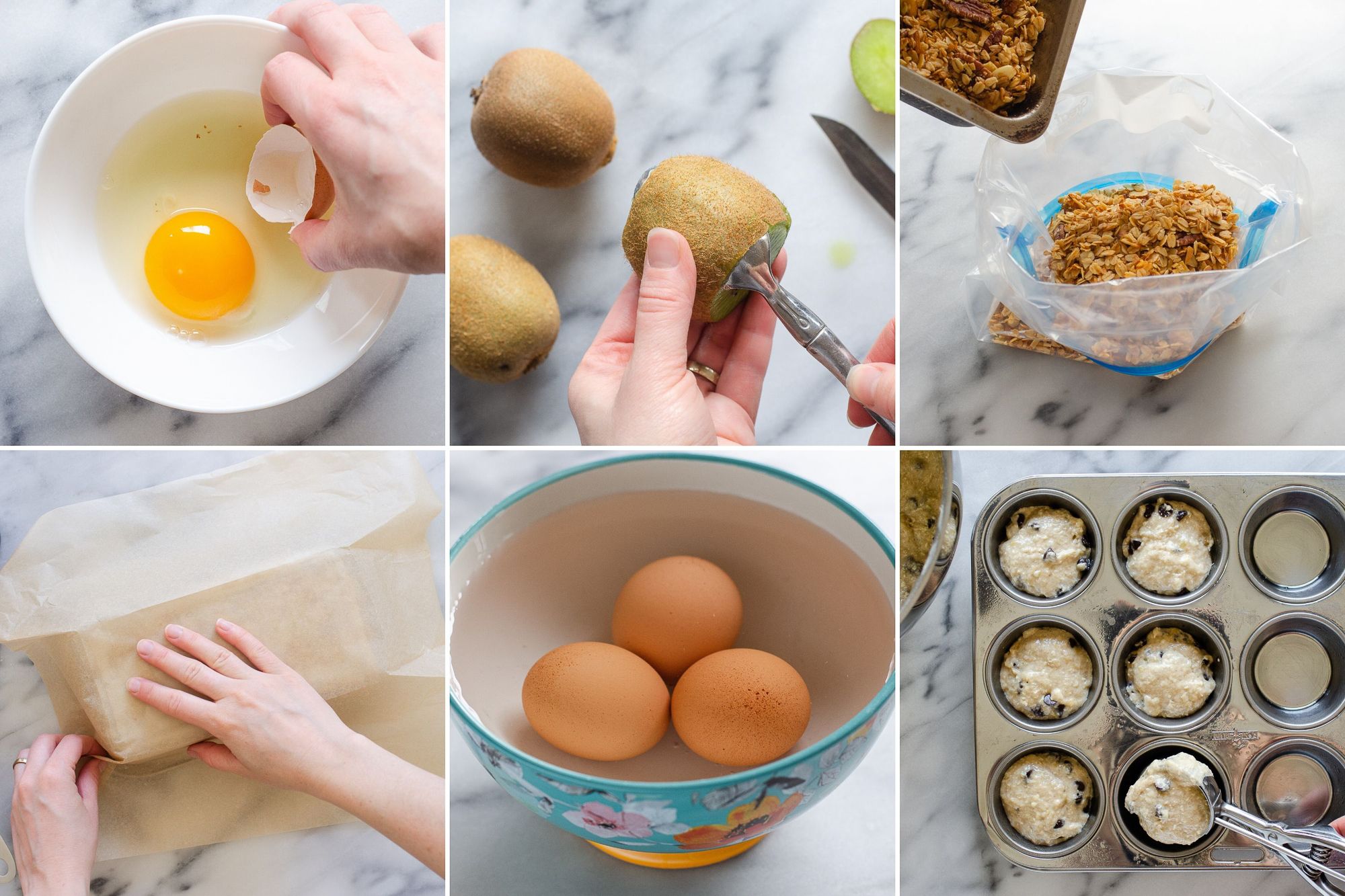Table of Contents
[ad_1]
After the dying of Caroline Rustigian’s mother previously this yr, her physical wellness took a tumble. “I stopped consuming and couldn’t preserve food down,” says Rustigian, a general public relations consultant and podcaster in Laguna Beach front, Calif.
Determined to feel superior, Rustigian went to urgent treatment, the place she was explained to that acid reflux was a person induce of her tummy difficulties. The doctor recommended medicine, which eased her pain. Nonetheless, the mom of two nevertheless did not experience like her previous energetic self. “I was fatigued and just making an attempt to get via every day,” she recalls.
Ultimately, Rustigian achieved with her naturopathic doctor, who mentioned grief was the culprit. “My health practitioner reported psychological stress and not consuming threw off the nutritious micro organism in my tummy, which compromised my microbiome.” A veritable universe residing in us, the microbiome has been garnering awareness from experts and the healthcare group for its impacts on human wellbeing.
“The microbiome is produced up of trillions of microbes, like bacteria, yeast, and viruses,” states Thalia Hale, a naturopathic practitioner in Palo Alto, Calif. These little organisms reside in our gut and on our skin. Like a really hard push that retains a computer system managing, this community can help the overall body synthesize and procedure important vitamins like thiamine, a B vitamin manufactured by intestinal microorganisms that fuels brain functionality.
A possible website link
In accordance to Hale, grief can toss the human body off system, upsetting the gastrointestinal tract. For starters, strain can activate the sympathetic nervous program, far more typically identified as the battle-or-flight reaction. In this survival point out, “heart price and blood strain increase, as do concentrations of the hormone cortisol,” Hale adds. And when the overall body is warding off danger, it’s not centered on digestion or feeding on. Rustigian suggests that right after her mom died, she didn’t consume for times. And investigate has uncovered that nutritional changes can change the microbiome in a make any difference of days.
While it is nicely recognized that heartache can make the stomach ache, exploration inspecting the relationship involving bereavement pressure and gut wellness is confined. Nonetheless, a single 2020 paper posted in the journal Frontiers in Psychiatry suggests that “gut microbiota could play a purpose in influencing health and fitness outcomes subsequent bereavement” since long-term and ongoing worry can disrupt the microbiome.
It is hard to entirely look at bereavement, due to the fact grief features other emotions these types of as anger, disappointment, and denial. When these inner thoughts linger, they can contribute to psychological overall health considerations like anxiety and melancholy. These conditions’ ebbs and flows have been connected to the germs residing in the intestine.
Browse Extra: Here’s Everything You Need to have to Know About Intestine Health
What science tells us
The relationship in between our brain and our gut, including the microbiota that prosper there, was surprising when it was 1st discovered far more than 10 years in the past. Thus much, most of the pertinent study has focused on animals, according to Karina Alviña, a neuroscientist at the University of Florida whose lab uses mice to examine how intestine flora influence mind operate. “In an animal design, you can [use antibiotics to] deplete practically all of the intestine microbiome and feed the mice with a individual formulation [of bacteria],” she claims, which enables experts to right exam the outcomes of a solitary bacterial species or a mixture.
In humans, the photo is murkier. But a workforce of researchers in Belgium was among the 1st to tie the qualities of an individual’s gut microbiome to actions this sort of as total joy and melancholy in a big-scale population examine released in 2019. “People who report low good quality of existence are inclined to have disturbed intestine microbiomes—and there was a notable decline of specified microorganisms that was extremely exclusively related to this decline of very well-staying,” says Jeroen Raes, a bioinformatician and senior author of the analyze.
Psychological health and the intestine-brain axis
Losing a liked 1 is by much one particular of the most annoying lifestyle situations. “My mother was my ideal good friend,” Rustigian claims. “When she died, I shed my accurate advocate, and I felt numb.” This emotionally minimal period of time can outcome in the reduction of snooze and hunger, as well as loneliness. And the ongoing strain might have an effect on what researchers contact the intestine-brain axis.
Hardly a ten years ago, the mind was assumed to be wholly isolated from the rest of the entire body. So for Alviña, “the most significant mindset change” was the realization that the mind not only instructs the human body to transfer and breathe, but that indicators from the gut as very well as other organs and tissues can also alter how the brain functions.
How the mechanism behind this bidirectional conversation works is an open issue, but quite a few attainable explanations have emerged. In the Belgian study, individuals with depression experienced less gut microorganisms that developed butyrate, a fatty acid important to intestinal overall health, with anti-inflammatory houses. The resulting irritation in the gut owing to the lack of these butyrate producers is “linked to the neuro-inflammation we frequently see in the context of depression,” Raes claims.
Far more right, gut germs make molecules these as dopamine and serotonin, which perform vital roles in neural signaling. Small stages of these neurotransmitters can cause melancholy and neurological diseases like Parkinson’s.
These neurotransmitters may interact with the nerve endings of the vagus nerve—which is liable for involuntary actions this kind of as breathing and digestion, and connects the mind to most of the body’s organs, like the intestine. Experiments on mice bolster this view. For animals where the vagus nerve was reduce, microbiome-mediated effects on their actions disappeared.
Probiotics: help or hoopla?
Offered the tantalizing evidence, an obvious next stage would be to provide the intestine with helpful probiotics. Raes, nonetheless, stresses that study on the intestine microbiome and its impression on grief and mental health and fitness is continue to in its infancy. And when “the prospective for probiotic intervention is thrilling, there’s not [currently] ample proof to suggest people today with melancholy to take them,” Raes claims.
Dr. Ripal Shah, an integrative medication expert and psychiatrist at the Stanford College School of Medication, agrees that the jury’s out on which bacterial species will establish most beneficial to people today. But at the same time, intestine overall health and tweaking intestine flora are frequent subjects in the weekly integrative psychological health and fitness group she potential customers with a colleague.
Over-all, grief is a complete-physique encounter, and Hale states that each stress-administration and nutritional tactics can aid in restoration.
Read through More: What We Know About Leaky Gut Syndrome
Dietary changes
Exploration implies that diet plan performs a considerable job in analyzing which intestine microorganisms keep on to prosper. And taking in foodstuff normally imbued with probiotics like fermented goods and yogurt is one particular simple way to aid restore gut health, suggests Shah. “But because we never know just which species are helpful—and how much—it’s truly beneficial to feel [of the goal] as raising the diversity of your gut flora.”
Swap up the cuisine, Shah advises. If you’re possessing kimchi a person week, kombucha the following week, and kefir the next week, you’re uncovered to a broader array of energetic cultures than if you’re just grabbing the very same model of kimchi each and every time.
De-stressing
Just one particular episode of despair or stress can develop a feedback loop, priming us for recurrences. “One of the pathologies of despair and anxiety may possibly be that they lead to the ratio [of gut flora] heading out of whack,” Shah suggests. “And then ongoing worry continues to skew or worsen that ratio.” Since of this, Shah says it is critical to locate ways to de-tension.
On the flip aspect, Shah claims, “the opportunity of favourable mood to impact the microbiome is really reassuring” due to the fact it signifies gut well being may be able to be manipulated with psychological-wellbeing interventions.
In the course of periods of immense mourning, tension management may well appear like putting a bandage on a gaping wound. Even so, Hale suggests these resources can assist the nervous procedure switch gears, placing the parasympathetic nervous procedure (which assists serene us down) again in the driver’s seat.
One straightforward exercising is referred to as “square breathing” or “box respiratory.” Just acquire a breath in and hold for 4 counts, exhale for four counts, and repeat 4 moments. Employed by Navy Seals in substantial-anxiety scenarios, this respiration strategy will help relaxed the autonomic anxious process, which restores leisure.
A 2017 research in the journal Frontiers in Immunology uncovered that routines such as yoga and tai chi may well enable reverse the consequences of strain on the physique. The researchers point out that these brain-physique interventions “reversed genes included in worry-induced inflammatory reactions.”
Shah also indicates acupuncture for her sufferers, which has been demonstrated to alleviate pressure in a lot of studies, and to have interaction in at minimum 30 minutes a working day of reasonable-intensity physical exercise.
And lastly, “any form of vitamin and mineral deficiency can be worsened or prompted by anxiety,” Shah notes. So addressing these deficiencies—primarily by eating plan relatively than supplements—is of tantamount worth. In the same way, avoid consuming foodstuff that boost inflammation, these types of as refined sugar, fried foods, or food items that you’re allergic to.
Examine Additional: The Truth of the matter About Common Digestive Health and fitness Fears
Embracing aid
A person way to cope with bereavement is to embrace added aid. “We’re not meant to grieve by yourself,” suggests Abigail Levinson Marks, a clinical psychologist in San Francisco who specializes in grief. “In almost all cultures, the way we deal with reduction is collective, for the reason that group allows us mend,” she provides.
Grief support teams and on the net message boards can be therapeutic, for the reason that they give you a possibility to fulfill and befriend fellow mourners. Marks adds that viewing your working experience reflected in an individual else’s story can assist you feel considerably less by itself.
Considering that each individual person’s route differs, team help might not be proper for absolutely everyone. If which is the scenario, speaking with a counselor can also assist. Not only will your therapist hear and empathize, but expressing your thoughts and emotions could have a good impact on your actual physical health much too. For occasion, one particular 2022 paper in the journal Dialogues in Clinical Neuroscience reiterates that keeping in our feelings may possibly direct to lower-amount strain, hindering the body’s immune response.
In addition to therapy and group aid, give by yourself authorization to say certainly when cherished ones offer assistance. For example, buddies may possibly just take on your house chores or run errands, or your employer may offer bereavement leave. “Anything that lightens your load can give you much more time for self-care,” Hale claims.
In our hurry-to-restoration lifestyle, we may perhaps decide ourselves when suffering lingers. But maintain in brain that healing is a journey, not a sprint. So even if your decline was months back or before the pandemic commenced, self-care, assist, and nutritious ingesting can however be helpful. Hale also reiterates that self-compassion is very important.
In the stop, Caroline Rustigian identified that an antidepressant, probiotics, exercising, and treatment helped to ease her grief—and her gut problems. “It took a while to determine out what was going on,” she says. “But once I started a mix of therapies, my abdomen troubles disappeared, and I acquired superior.”
Much more Ought to-Read Stories From TIME
[ad_2]
Source connection







More Stories
Eat the Rainbow Week 7: Tasty Snacks
Lowestoft: NR Health and Fitness take over Nirvana gym
My 6 Favorite Meatless Meals from Around the Internet